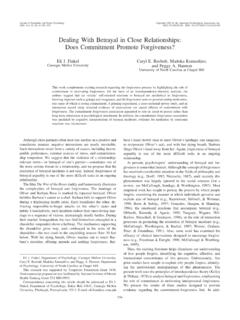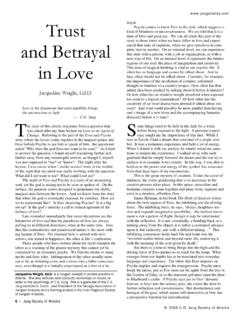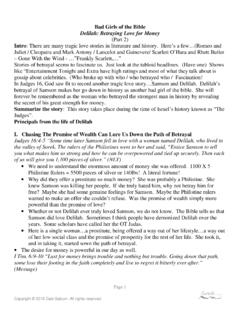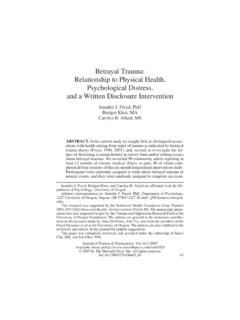Transcription of The Sense and Sensibility of Betrayal: Discovering the ...
1 72 Volume XIII, No. 2, 2000 Rodger L. JacksonThe Sense and Sensibility of Betrayal: Discovering the Meaning of Treacherythrough Jane AustenRodger L. JacksonThe Richard Stockton College of New JerseyIntroductionIn the past few years the charge of betrayal has become alltoo common. Yet, with all the fanfare and publicity attached tothese charges, there has been surprisingly little written about whatwe even mean by the term. It clearly matters a great deal to us. Anact of betrayal makes us appreciate Dante s reserving the inner-most ring of the Inferno for the betrayers. We can even say thereis a characteristic feel to betrayal .
2 The betrayed experience pow-erful sensations of violation; they feel used and damaged. Be-trayal, however, elicits more than strong feelings. Psychologists of-fer clinical evidence attesting to the devastating effects betrayal acts as an assault on the integrity of individu-als, affecting the capacity to trust, undermining confidence injudgment, and contracting the possibilities of the world by in-creasing distrust and betrayal changes not only oursense of the world, but our Sensibility toward the charge of betrayal , then, must be taken seriously. While itlSee for example: William Haley and Bonnie R.
3 Strickland, InterpersonalBetrayal and Cooperation: Effects on Self-Evaluation in Depression, Journal ofPersonality and Social Psychology 50, no. 2 (1986): See for example: Tina Rosenberg, The Haunted Land: Facing Europe s GhostsAfter Communism (New York: Random House, 1995).HUMANITAS 73 The Sense and Sensibility of Betrayalmay be that a particular case of betrayal is justified, the burden ofoffering that justification clearly belongs to the betrayer, not to thebetrayed. Many, however, have been accused of betraying some-one and felt respond with outrage, defensiveness, or merely confu-sion.
4 Sincerely believing their actions do not constitute betrayal ,they do not feel obliged to offer justification. Instead they may de-mand explanations and apologies from the accuser, who alreadyfeels injured. Such conflicts raise the important question: how dowe separate genuine instances of betrayal from merely felt in-stances? Psychological studies do little to illuminate this question,since such studies typically concern the effects of betrayal on anindividual, and for this purpose it matters little whether the be-trayal is genuine or the purposes of moral assessment, however, it surely mat-ters a great deal whether an actual betrayal occurred.
5 Further, be-cause even a merely perceived betrayal ruptures trust and con-taminates relationships for both parties, negative consequencesmay be mitigated if a legitimate interpretation of the incident canbe offered. Refining and clarifying exactly what betrayal is, thecontext within which it occurs, and how it differs from other trustviolations, may allow a more reasonable assessment of , we must turn away from psychology and look to moralphilosophy for , the philosophical literature does not offer as muchhelp as one would like to sort through this issue. Two in-depthdiscussions of betrayal , however, are found in Judith Shklar s The Ambiguities of betrayal 3 and Peter Johnson s Frames of Although Shklar deftly uncovers the many ambiguities sur-rounding betrayal and Johnson provides an excellent study of for-giveness, neither furnishes a detailed discussion of what the term betrayal means.
6 But only a clear Sense of betrayal will allow the rea-sonable assessment that puts betrayal in its proper example, Shklar does at one point characterize betrayal asan act in which one person should have both intentionally con-vinced another person of his future loyalty and then deliberately3 Judith Shklar, The Ambiguities of betrayal in Ordinary Vices (Cambridge:Harvard University Press, 1984).4 Peter Johnson, Frames of Deceit: A Study of the Loss and Recovery of Public andPrivate Trust (New York: Cambridge University Press, 1993).Distinguish-ing genuineinstances ofbetrayal fromthose that aremerely felt.
7 74 Volume XIII, No. 2, 2000 Rodger L. Jacksonrejected him. 5 Yet she lists as betrayals such examples as expe-riencing the social mores and traditions one grew up with becom-ing outdated and being in a marriage where one partner outgrowsthe other. Shklar is interested in exploring our mixed feelingsabout such familiar experiences. To categorize these sorts of situa-tions with Von Stauffenberg s betrayal of Hitler or MadameBovary s infidelity, however, makes it very difficult to sort out thesalient features of actual betrayals, assess them morally, or deter-mine appropriate responses to Shklar and Johnson argue, however, that trust and be-trayal are best understood through a careful reading of some extent it is unsurprising that they look to literature ratherthan to philosophy for insight into betrayal .
8 In literature, an eventsuch as betrayal usually takes place in full view and accompa-nied by significant details about the characters, including their his-tories and environments. Further, in literature unlike philosophy,trust and betrayal are common themes. Shklar and Johnson eachprovides an assortment of alleged betrayals to consider, highlight-ing the character of individuals, their circumstances, and their mo-tivations as important elements in assessing betrayal . Yet neitherwriter has a systematic way of differentiating between a genuinebetrayal and a merely perceived betrayal . Such distinctions, how-ever, are critical for moral assessment and for a reasonable inter-pretation of the is both a people problem and a philosopher s prob-lem.
9 Philosophers should be able to clarify the concept of betrayal ,compare and contrast it with other moral concepts, and criticallyassess betrayal situations. At the practical level people should beable to make honest Sense of betrayal and also to temper its con-sequences: to handle it, not be assaulted by it. What we need is aconceptually clear account of betrayal that differentiates betweengenuine and merely perceived betrayal , and which also providessystematic guidance for the assessment of alleged betrayal in what follows I offer an account of betrayal that attempts tomeet the two requirements of conceptual clarity and contextualadequacy.
10 There is a great temptation to use the events in Wash-ington of the past few years as the case study for such an analysis,5 Shklar (1984), 75 The Sense and Sensibility of Betrayalbut I believe that, for a variety of reasons, including the difficultyof viewing events from within, this would only complicate mat-ters rather than clarify them. Rather, like the authors cited, I toobelieve that betrayal in literature is fruitful ground for analysis. Ihave chosen Jane Austen s Sense and Sensibility for examples oftrust and betrayal , because Austen displays the needed complex-ity and subtlety of human relationships and because she recog-nizes that violations of trust come in a variety of shades and col-ors.












